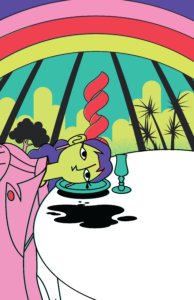“I Love You So Much”
Sydney Ziettlow

and other things we say to people we will never meet...
Parasocial relationships have become a norm in modern society. These one-sided relationships, where one individual pours emotional energy, interest, and time into another who is unaware or only vaguely aware of it, have become increasingly common due to the ease with which people can nurture these relationships through the internet. From singers and actors to reality TV stars and social media influencers, it has become normal to invest significant time to keep up with the lives of those we will never really know.
Many artists and public figures have recently spoken out about the dangers of such relationships, emphasizing that while fans often feel like they “know” a celebrity, they actually know very little about the person behind the persona. Even when celebrities share personal details, there’s a critical reality to recognize: just because someone is in the public eye doesn’t mean we know everything about them. But where and how do we draw the line? How is it acceptable to be so invested in the lives of people we will never really know?
This fascination with other people’s lives isn’t new. Idolization has long been a part of human society—it’s part of why monarchies thrive and why books and their characters have such a lasting impact. Storytelling has been an art form since the dawn of time, with tales of wealth, fame, and social influence passed down through generations. These stories teach us to covet these traits and play into our deep-seated attraction to heroism. “Royals and other people, like Hollywood figures and Kardashian types, keep that phenomenon alive”, as they illustrate in a tangible way the traits we’ve been taught to value since childhood.
This inspiration through aspiration has become even more accessible through the Internet, where we’re fed curated depictions and stories of the lives of others. Online, individuals can craft how others will perceive them and develop an aspirational aesthetic. This aesthetic entices individuals to follow and invest their energy in this creator—we want to see this curated perfection that we desire in our lives instead of seeing the mundane.

One of the positive aspects of parasocial relationships is the opportunity for inspiration and self-exploration. By observing figures we admire, we can learn more about ourselves. We can try new identities, set new goals, discover different ways of expressing ourselves, and discover new interests and preferences. These relationships can expose us to a variety of opinions and give us new perspectives on life. Additionally, devotion to some celebrities can foster a sense of community. Shared admiration for a public figure can be the foundation of new friendships. As humans, we are wired to seek connections, and bonding over common interests in pop culture is one of the ways we create community. Some of my closest friendships began because we admired the same singer or YouTuber, which later revealed more shared interests unrelated to the content we initially connected over.
However, parasocial relationships can also lead to negative self comparisons and hyper criticism. Most users, popular figures and the general public alike, only present a curated version of their lives online. While some share more than others, it’s easy to forget that these are strategically perfected highlight reels for public consumption. These highlights can make us question our own choices and actions. The slippery slope from inspiration to unhealthy comparison is all too real, and it takes self-awareness to remember that we’re only seeing part of someone’s life: the selected story they choose to tell. It’s important to remind ourselves that these deep connections we feel are not genuine relationships.

Parasocial Bonds: Navigating the Line Between Connection and Obsession
As we spend more time in the digital world, parasocial relationships may start to feel more substantial than our real-world interactions. With the ability to comment, message, and share content about public figures, these connections can feel intimate and satisfying in ways that fool our brains into seeing them as substitutes for real human relationships.
This increased accessibility has also led to fans demanding personal details from public figures—details we wouldn’t normally ask someone we’d just met in real life. Common courtesy seems to erode when we interact through a screen, with some fans engaging in highly obsessive behaviors such as stalking or hacking sensitive information just to feel “closer” to a celebrity. Public figures are increasingly speaking out about how they feel endangered, not only by people who have blatant ill intent but also by fans who are willing to go to insane lengths to get closer to them. As more influencers and celebrities express discomfort with how far some fans take these interactions, the question of what constitutes a healthy parasocial relationship becomes more pressing. While they can offer inspiration and a sense of connection, it’s vital to remember the value of real human relationships. Our brains were not designed to handle the constant exposure to opinions and connections that the digital world offers. This being said, there is also room to keep tabs on your favorite celebrities or draw outfit and meal inspiration from influencers, as long as you remember they are real people choosing to share a hand selected part of their lives.
The next time you comment “I love you” on your favorite celebrity’s post, pause and reflect. What do you really love? Is it the way they inspire you, the community they’ve helped you find, the new perspective they’ve given you, the comfort their art has brought to your life, or something else?



